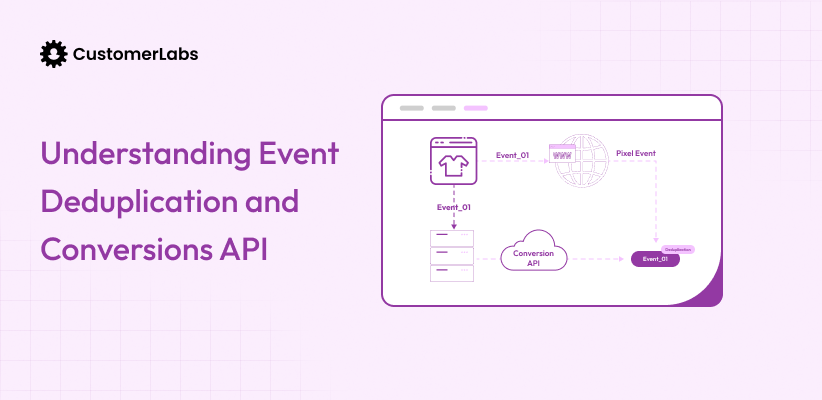Consider yourself in charge of navigating a ship through the enormous expanse of digital marketing. Your compass? Data. What occurs, though, if that compass begins to provide inaccurate readings? This situation occurs in the context of online marketing when your server provides PageView events with invalid match key parameters. It’s bothersome and potentially disastrous, like attempting to navigate with a damaged compass. Accurate event tracking is essential to successful marketing initiatives in today’s data-driven world.
According to the Gartner report, 53% of marketing decisions are influenced by marketing analytics. However, the dependability of your data suffers when important factors like fbp, ip_address, and user_agent go wrong, resulting in distorted insights and poorly targeted campaigns.
In this article, we’ll break down the typical causes of invalid match key parameters and how they impact your campaigns. We will also provide actionable solutions to ensure your event tracking stays accurate and effective.
What Are Invalid Match Key Parameters?
Invalid match key parameters are the specific pieces of data used to link user actions (like PageViews, clicks, or conversions) to a marketing platform or analytics system. When these parameters are incorrect, missing, or misconfigured, it leads to flawed tracking and inaccurate insights.
Understanding the impact of these errors is essential. They can disrupt delivery optimization, distort attribution models, and ultimately harm your ROI. However, you can get your marketing strategy back on track by identifying common issues and implementing best practices.
Now that we’ve covered what invalid match key parameters are, let’s look at some examples you’re likely to come across.
Common Invalid Match Key Parameters
Certain criteria are necessary for precise data collecting in event tracking. However, issues often arise with the following:
- fbp (Facebook Pixel ID): This parameter identifies unique users visiting your site. Errors in tracking may result from misconfigurations or inconsistencies.
- Ip_address: For location-based analytics, it is essential to record the user’s IP address. Inaccuracies may arise from inaccurate data or confidentiality.
- User_agent: This string gives details about the user’s device and browser. Missing or misconfigured user-agent strings can disrupt data collection.
These parameters are crucial for the accuracy of your event-tracking system. When they are incorrect or missing, it can lead to faulty data, making your tracking unreliable.
Understanding these common parameters is just the start—let’s explore how they can affect your marketing efforts and optimisation strategies.
Impact of Invalid Parameters on Marketing and Optimization
Invalid match key parameters can wreak havoc on your marketing efforts in several ways:
- Attribution Errors: Inaccurate parameters may result in flawed attribution models, which could mislead you about the campaigns or channels generating conversions. Missed opportunities and improper budget allocation may arise from this imbalance.
- Delivery Optimization Challenges: Accurate data is essential for platforms like Facebook to maximize ad delivery. This procedure can be hindered by invalid parameters, resulting in less successful campaigns and wasted advertising money.
- Data Accuracy Issues: Inaccurate data collection affects your ability to make informed decisions. For example, your location-based targeting may be completely off if the ip_address data is inaccurate.
Overall, invalid parameters undermine the foundation of your marketing strategy, making it harder to optimize and achieve desired results. Having understood the impact of invalid parameters on marketing and optimisation, let’s explore the reasons behind this error and what might be causing it.
Why Is the Server Sending Invalid Match Key Parameters for PageView Events?
This is a common headache for marketers—servers sending invalid match key parameters for PageView events can disrupt your entire campaign tracking and performance analysis. Don’t worry, though; this section breaks down why it happens and how you can fix it, so you’re not left guessing.

The error “Server Sending Invalid Match Key Parameters for PageView Event” typically occurs when the data you’re sending to Facebook through the server-side API (Conversion API) is either improperly formatted or does not meet the expected criteria. Here’s a breakdown of why this happens and how to address it.
Common Reasons Behind Invalid Match Key Parameter Errors
Let’s break down some of the most common reasons this error pops up, so you can pinpoint what’s causing the issue.
1. Incorrect Formatting of Data: Facebook expects specific formats for the match key parameters (like email, phone number, or IP address). For instance:
- An email address should follow the standard format (e.g., [email protected]).
- A phone number should include the country code and be numeric only (e.g., +911234567890).
- An IP address must not include symbols or characters other than valid numeric and dot-separated values.
- Using the Wrong Variables: Sometimes, the wrong data is mapped to the required fields. For example:
- Sending a phone number in the “email” field.
- Using auto-detected data like the user’s location based on their IP address instead of the actual information provided by the user.
- Missing Required Parameters: If you fail to include necessary match keys such as email, phone number, or address details, Facebook won’t be able to link the event to a specific user. This is especially important for events like “PageView” that require detailed user data.
- Reusing Values Across Events: Attempting to send identical match key values (e.g., the same username or email) for all events can also trigger this error. Facebook may flag this as invalid because it doesn’t reflect unique user data for each event.
Now that you know what’s causing the issue, let’s move on to how you can fix it and some best practices to keep it from happening again.
Fix for the Server Sending Invalid Match Key Parameters for PageView event and Best Practices
To keep your event tracking clean and neat, consider the following strategies:
Check Data Formatting:
- Review the match key parameters being sent to Facebook.
- Use Google Tag Manager’s preview mode (for both server and web containers) if you’ve set up the Conversion API through GTM.
- Test events in debug mode and inspect the tags and variables being sent to Facebook.
Validation and Correction:
- Ensure all parameters are in the correct format:
- Email: Check for proper structure ([email protected]).
- Phone: Include country codes (e.g., +91 for India) and remove any extra characters.
- IP Address: Confirm it contains only valid numbers and dots.
Avoid Auto-Detected or Proxy Data
- Use actual user-provided data wherever possible.
- For instance, instead of auto-populating city and country based on IP addresses, collect these details directly from the user on your website.
Test Your Setup
- Run tests using Facebook’s Event Testing Tool.
- Look for any flagged parameters or errors in the setup and adjust accordingly.
Map Correct Variables
- Double-check your mapping in GTM to ensure that the right variables are being sent to the appropriate fields. For example, map “email” to the email field and “phone” to the phone field.
Use a Reliable CAPI Connection:
Setting up and managing the Facebook Conversion API (CAPI) correctly can prevent most of these errors. Tools like CustomerLabs 1PD Ops make it easy to establish a seamless CAPI connection. By ensuring the right data is sent in the expected format, this solution eliminates errors and saves you time troubleshooting match key issues.
Regular Maintenance:
Focus on reviewing your server configurations on a regular basis and updating them as necessary to comply with new laws and technology.
By following these practices, you can strengthen your data infrastructure, ensuring your marketing efforts are both precise and effective.
However, there may be instances where your internal efforts aren’t enough, and professional assistance is needed to resolve more complex issues.
Collaborating with Technical Support
Sometimes, despite your best efforts, issues persist. In such cases:
- When to Seek Help: Get in touch with technical support if you keep seeing inconsistent data or if you keep getting error messages that you can’t fix.
- Providing Key Information: When reaching out, supply detailed information about the issue, including error messages, steps to reproduce the problem, and any recent changes to your setup.
- Leveraging Resources: To discover answers and keep up with best practices, make use of support resources, including knowledge bases, forums, and direct help channels.
With a clear understanding of when and how to involve technical support, you’ll be better equipped to address persistent issues swiftly and ensure your event tracking remains accurate and reliable.
Conclusion
Accurate event tracking is the backbone of effective marketing strategies and invalid match key parameters can severely disrupt this foundation. You may safeguard the integrity of your data by being aware of the common offenders, such as fbp, ip_address, and user_agent, and taking care of the underlying causes, whether they are technological misconfigurations, human error, or data privacy restrictions.
Maintaining a strong tracking system and preventing expensive attribution and optimization errors requires regular audits, sophisticated diagnostic tools, and cooperation with technical assistance.
CustomerLabs 1 PD Ops is a reliable partner for streamlining and improving your server-side tracking. Their platform ensures adherence to privacy regulations such as the CCPA and GDPR while assisting you in identifying and fixing invalid parameters. Their systems enable accurate and seamless event tracking, regardless of the size of your company. Visit CustomerLabs 1PD Ops to see how it may revolutionize your data operations and help you achieve more success with your marketing.






